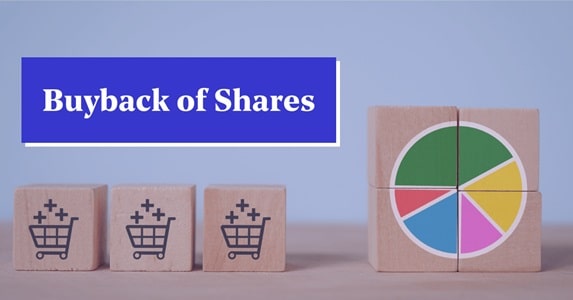Buyback of shares is a pretty much simple thing, and as the name of this action gives it away, it is when a company decides to buy back its own shares. That’s how simple it is. But now you might be wondering like why would companies even do that, and it might sound a little sketchy to you as well, right? Well, if that’s the case then you may wanna read through our today’s post where we will be diving deep into the discussion about the possible advantages and disadvantages of the buyback of shares. So yeah, here we go.

Advantages of Buyback of Shares
Off to the positive side of things with this whole buyback of shares thing, shall we?
1. Boosting Shareholder Value
When companies go for share buybacks, it’s like they’re giving their Earnings Per Share (EPS) a real boost. It’s all about playing the numbers game smartly, when a company buys back its shares, the total number out there drops, and what does that do? It makes each share left in the game more of a heavyweight in terms of the company’s earnings. So, what’s the deal for shareholders? Simple, their investment suddenly starts shining brighter. It’s like having a bigger piece of the pie with fewer people at the table, making each slice, or in this case, each share, way more valuable both in terms of company earnings.
2. Smart Cash Moves
Share buybacks are a savvy way for a company to use its extra cash. Rather than letting this cash just sit there earning little to nothing, or putting it into stuff that doesn’t give much back, companies can choose to buy back shares. This move is often seen as a slick strategy to make the most out of the company’s capital structure. By reducing the equity bit and maybe upping the debt, companies are aiming for a capital structure that’s more on point, balancing their debt and equity to really maximize shareholder value.
3. Big Confidence Wave
When a company starts buying back its own shares, it’s like they’re shouting out to the market, ‘We believe in our future!’ This kind of move can really catch the eye of more investors. This act of betting on themselves can be a huge draw for both current and potential investors, who might see it as a sign that the company’s in great shape and has a shiny future ahead.
4. Promoters Playing the Power Game
Here’s an interesting twist: when a company plays the buyback card, the promoters’ share of the pie gets bigger. They don’t even need to lift a finger in the buyback, their slice just gets richer automatically. Why does this matter? Well, in the game of business, especially in India’s family-run empires, this move is like fortifying your castle against invaders.
5. Making the Numbers Dance
After a buyback action, financial ratios like EPS, ROE, and ROA get a makeover. The magic? It’s all in reducing the number of shares out there. Sure, it’s a bit like financial gymnastics, but the market loves a good show of strength in numbers.
6. The Demand-Supply Thing
Ever thought about what happens to share prices when there are fewer of them up for grabs? Its basic marketplace balance, less supply with steady or growing demand can send prices climbing like crazy. When a company pulls its shares out of the market, it’s like creating an exclusive club, everyone wants in, but there’s only so much room. This is kinda scarcity, and it is good for the businesses and of course, the investors.
Disadvantages of Buyback of Shares
Alright, now’s the time to consider what is really up with this sort of action, here we go.
1. Opportunity Cost
Let’s say a company’s got a chunk of money to spend. They could either buy back their shares or, wait for it, invest in something super cool like expanding into new territories, diving into research for next-gen products, or some other strategic move. But here’s the thing though, every time they choose to buy back shares, they might be missing out on an opportunity that could have been a goldmine in the long run.
2. Market Timing Risks
Imagine a company trying to buy back its shares when the market prices are soaring high, like a kite on a windy day. What happens? They end up paying a fortune for these shares. Talk about a bad deal, right? And in markets like India’s, where prices swing like a pendulum, this gets even trickier. Companies can easily slip up on the timing, and whoops, there goes the finances down the drain.
3. Misleading Financial Improvements
Now, here’s a little magic trick companies pull with share buybacks. You see, by reducing the number of shares floating around, they pump up their earnings per share (EPS) and return on equity (ROE). But yeah, it’s just a financial facelift, not real growth from, you know, selling more stuff or being more efficient.
4. Management Errors
You see, sometimes, the decision-makers at a company might get a bit too confident, thinking they know the company’s worth better than anyone else. But here’s the thing, they can be wrong. And their decisions might not always be in the shareholders’ best interests. Especially in India, where corporate governance is still dealing with transparency, this can be a bit of a sticky wicket.
5. Reduced Company Value
Here’s the immediate aftermath of a share buyback, the company’s piggy bank takes a hit, or they end up owing more money, depending on how they fund this whole thing. The bottom line? The company’s value shrinks by the amount they splurge on the buyback. The plan might be to make shareholders happy, but sometimes, it’s more like taking one step forward and two steps back.
6. Potential for Financial Engineering
Last but not least, let’s not forget this little maneuver, which is none other than using buybacks as a fancy financial tool. Some companies might play this card to pump up their stock prices, creating this illusion of a booming business. But it’s just that, an illusion, no real improvement in how the business is actually doing.
Conclusion
There you have it. Now with these positives and negatives of the buyback of shares, you must be feeling a lot clearer in your head, right? But keep in mind though, there could be some legal consequences to it too, but that totally depends upon which part of the world we are talking about.

Meet Suhas Harshe, a financial advisor committed to assisting people and businesses in confidently understanding and managing the complexities of the financial world. Suhas has shared his knowledge on various topics like business, investment strategies, optimizing taxes, and promoting financial well-being through articles in InvestmentDose.com


